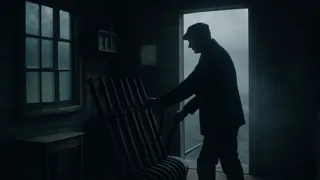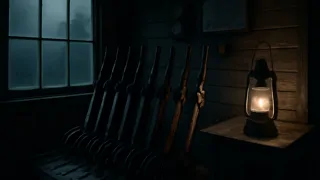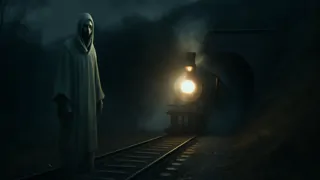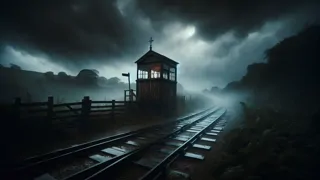Introduction
On a windswept moor in the United Kingdom, the railway cutting lay shrouded in mist, its iron tracks stretched like dark ribbons disappearing into the grey horizon. I arrived at the signal box during a waning April afternoon, drawn by reports of strange accidents and whispered omens. The solitary structure, perched on a moss-covered embankment, bore the scars of time: faded white paint peeling from the weathered timbers, rusted hinges creaking against the pull of the damp air. Inside, the signal-man moved with deliberate precision, his eyes glinting beneath a deeply furrowed brow that spoke of countless sleepless nights. Lantern light flickered across a tangle of polished levers and gauges, each mechanism a solemn testament to the silent pact between man and steel. He greeted me with a curt nod, as though offering companionship against a chill no winter wind could sever. Rumor had it that he was haunted by premonitions—spectral visitations heralding catastrophe moments before each fatal derailment. My journalist’s curiosity battled with an intuition that warned me against probing too deeply into his tormented mind. The air felt charged, as if hidden currents of grief and guilt pulsed beneath the signal box floorboards. Whispers of lost travelers and broken carriages lingered like a half-remembered dream, echoing through the thrum of distant machinery. Before the edge of twilight, I sensed something weigh upon our gathering stillness, an unspoken warning etched in the quiet clank of iron on steel. In that moment, as rain pattered against the single-pane window, I realized that I had crossed into a story where history and the supernatural intertwined. It was a tale of fate written in rivets and timbers, waiting to reveal its final signal to any who cared to listen. Thus began my vigil alongside the haunted signal-man, poised at the boundary of dread and revelation.
Shadows on the Rails
The late afternoon mist clung to the embankment like a silent shroud, obscuring the iron rails beyond the small, weathered signal box. I first glimpsed the signal-man through a lattice window, where his lean silhouette moved with precise, mechanical motions. He wore a threadbare waistcoat layered beneath a sooty coat that spoke of countless days spent surveilling the same stretch of track. His face was pale where the sinking sun failed to reach him, and his hollow eyes betrayed a longing I would soon come to understand. I introduced myself with a polite cough, but he scarcely glanced my way before adjusting a crimson disc by the levers. The machinery moaned with a faint rhythm, echoing the distant whistle of an approaching train that seemed to emerge from the heart of the fog. I offered him my card, hoping to break the silence hanging between the walls like a stubborn cobweb. At last, he halted his work and fixed me with a stare that was both curious and wary, as though I walked into a scene already set in motion. He spoke in low tones, his voice tinged with an accent shaped by the rolling hills and industrial clang of northern England. When I asked about the strange accidents that had marred this line, his jaw tightened, and he exhaled a breath that whispered of secrets. He explained that he was haunted by visions—phantoms that appeared before each calamity, shapes he could neither name nor banish. As he described the visiting specter, I felt a chill stride across the room, though the air remained still. A bell clanged somewhere beneath the floorboards, punctuating his words with a metallic urgency that set my nerves on edge. He spoke of premonitions that came unbidden in the half-hour before disaster, images of twisted wreckage and cries in the darkness. I pressed for more details, determined to treat his tale as matter for a modest article, but he shook his head in quiet desperation. It was clear he feared the very destiny etched into the rails, as though the iron tracks themselves conspired against him. When I rose to leave, the flicker of lantern light revealed the shape of footsteps pressed into the earth outside, vanishing into the fog.

The next morning, I awoke with the signal-man’s confessions weigh heavily upon my thoughts, the memory of his haunted gaze forging an unshakable curiosity. Rain pattered against my windowpane as I prepared to retrace my steps along the lonely track, determined to witness whatever apparition had so unsettled him. Upon my arrival, the signal box stood forlorn against a gray sky, its wooden beams bowed by seasons of relentless wind and ice. The signal-man greeted me with a terse nod, his hands stilled, betraying a tension that made the carved wood beneath them seem fragile. He informed me that on the previous night, just as the iron bell—an antique relic—had tolled seven times, the specter had appeared again. He described a tall figure robed in shadow, standing at the curve of the rail, wrists trembling as if shackled by some invisible force. According to his account, the ghost’s motions were deliberate, almost ritualistic, as though it performed an act impossible for any living man. My skepticism wavered when he produced a fragment of red cloth, frayed at the edges, that he swore he had found where the spirit had paused. From the distance, a distant whistle broke the air; the approach of a train seemed to respond to his undying dread. I stepped outside to stand where he had stood and felt the current of premonition slip past me, cold as the whip of iron on steel. A faint wail rose above the drizzle, as though the earth itself cried out with sorrow, but the signs remained elusive and unseen. The signal-man spoke again of voices carried on the wind, pleading for mercy in a language older than any modern tongue. He confessed to sleepless nights—visions replayed in ceaseless loops, each collapse of carriage and scatter of victims tattooed on his mind. At that moment, the rails thrummed with a distant pulse, an unspoken warning that echoed the dread lodged in his heart. We watched the fog gather at the bend, fingers of mist weaving between the sleepers with deliberate patience. I realized that the machinery of prophecy and fear had entwined themselves around the signal-man’s life, as unbreakable as the iron rails underfoot. When the train’s light finally emerged, a piercing glow swallowed the cutting and revealed two figures: one living, one long departed.
In the days that followed, I returned once more to the crestfallen box, resolved to stay through the midnight watch if only to shield him from some unseen peril. The signal-man’s eyes glowed with relief at my company, and for a fragile moment, he seemed nearly at ease, as though my presence could stave off the night’s horrors. Yet as the clock neared six thirty—half an hour before the usual hour of dread—his muscles tensed, and he clamped both hands on the signal lever. A sudden gust of wind rattled the lantern glass, sending flickers of silver light dancing across the walls and illuminating his ashen face. He hissed a whispered warning, urging me behind the safety of the thick door, but I refused to cower when he needed an ally. A distant clamoring rose from the rails below, not the normal thunder of an approaching train but a low, lurching cry that crawled through the stones. In that moment, time dilated: the signals hung motionless, and the world held its breath, as if proper motion depended on some unseen latch clicking into place. I sensed a form drifting into the pale beam of the lantern, shrouded in tattered finery that clung to a silhouette bent with silent lament. The signal-man’s eyes locked onto the shape, and I saw a crack of recognition, followed by an anguish that fractured his voice in half. An otherworldly chorus of whispers swirled around me, each syllable torn from the depths of regret and loss, summoning me toward the rail. I reached out to drag the signal-man to safety, but he recoiled, murmuring that some tragedies could not be interrupted. The specter paused at the edge of the cutting, its head tilting in a whisper of rusted iron, before advancing toward the line. I heard the grinding of steel on steel, a sound that foretold calamity but moved in impossible counterpoint to the flicker of the lantern. In the final instant, the ghost raised a pale hand, beckoning the oncoming train into a grim rendezvous that would be written on every sleeper. The signal-man screamed a warning that tore through the stillness, and the only answer was the wrenching roar of metal colliding with fate. When I recovered my senses, the rails lay silent, the mist swallowed the aftermath, and the signal-box door hung open like a wound. The signal-man was gone; only his lamp remained, its flickering beam searching the darkness for a master who would never return.
Echoes of Past Tragedies
My curiosity propelled me beyond the signal box into the heart of shadowed woods that bordered the iron tracks, seeking whispers of the unnamed tragedies the signal-man described. I stumbled upon an old book sheltered beneath a stone ledge, its leather cover scored by weather and time, filled with faded notations about fatal collisions. Page by page, I traced the accounts of lost travelers and the mournful aftermath that lingered like a stain upon the countryside. Each entry referenced the same obsidian marking—two crossed lanterns carved into the margin whenever the signal-man’s specter had been sighted. Local villagers spoke of how the box stood as a sentinel over grief, where families awaited news or forewarned of sorrow yet to come. An elderly stationmaster recounted the day a locomotive careened around the bend, its whistle a ragged cry that announced the end of two lives. He recalled how, moments before the crash, the signal-man had paused to whisper under his breath and shudder as though the earth itself had spoken. On a solitary bench beneath a gnarled oak, I found a fragment of the station’s last telegram, its ink smudged by tears and rain. It bore a single line: ‘Prepare for impact—no survivors,’ an eerie echo of the signal-man’s own warnings uttered in the hours that followed. The chilling symmetry between fact and apparition unsettled me, binding me more tightly to the enigma at hand. I realized that the past had not relinquished its hold on this track; it lingered, spectral and relentless, woven into the rail’s steel sinews. As dusk fell, I closed the battered tome and sensed the corridors of time converge upon me, footsteps approaching from the rail. Returning to the signal box, I carried the weight of these revelations like stones in my coat pockets, each memory a promise of dread. I arrived to find the lantern’s glow flickering, its flame dancing with unseen breath that seemed to whisper names beyond human reach. The signal-man met me at the threshold, his face drawn tight as cords, and motioned me to follow him inside. In that confined space, the air hung heavy with anticipation, as though history itself was poised to unveil its final act.

Night deepened around us, and the signal-man leaned close, his whisper trembling like the flame that danced between us. He recounted the strangest occurrence he had witnessed: the specter’s arrival coincided with a sudden drop in temperature, a freeze that solidified every drop of moisture around him. I watched frost bloom on the windowpanes, delicate ice fractals that mirrored the pattern of terror etched into his eyes. He described hearing voices that spoke of unfinished business, of a soul tethered to the steel rails until justice was served. Each time he attempted to trace the origins of the voice, it dissolved into a rush of static sound, like a telegraph line sputtering under stormy skies. He had questioned local lore and dismissed enchanted curses; instead, he suspected that some grievance had been bound to the iron itself. At one turn, he tried to place the ghost in context, comparing it to tales of engine spirits or lamplight phantoms, but none matched its solemn presence. I asked if he believed the specter sought retribution or release; he paused, then admitted he had neither answer nor hope. Outside, the rails hummed with a low resonance, a hum that connected the past accidents to the present hush. I offered theories of electromagnetic anomalies or residual energy, but he shook his head, convinced that the phenomenon was beyond the reach of science. Silence stretched between us until the lantern guttered, and he bolted upright, eyes drawn to a distant shape moving in the haze. We leaned together at the window, breath held, as a pale figure emerged from the mist, its hand raised in a gesture both sorrowful and insistent. The signal-man crossed himself and whispered a litany I did not recognize, as though calling upon an authority older than faith. The ghost paused at the edge of vision, its form shivering, then stepped back, dissolving into the blur of night. No sound followed, yet the quiet felt heavier, as if the air itself mourned the weight of unspoken farewells. The signal-man clasped my hand, his grip seeking proof that I was flesh and blood, not another herald of doom. I departed before dawn, clutching the worn book and the memory of its frost-bound pages, aware that the line between life and death had grown thinner still.
With each visit to the old cutting, my notes swelled, but my confidence waned, for facts alone could not settle the unrest that clung to every rail. I consulted engineers and clergy in nearby towns, only to find either dismissive skepticism or anxious superstition in response to my report. One by one, the pieces refused to coalesce, floating free like cinders in an unquenchable fire of unanswered questions. Still, I could not resist returning when the signal-man summoned me with a letter written in trembling script. In the candlelit gloom of the signal box, he confessed that the specter had begun to appear at intervals outside the traditional hour of dread. He spoke of dreams so vivid that day and night blurred, and he no longer knew which moments were visions and which were memory. During our last vigil, he claimed the ghost had handed him a gloved hand, as if seeking aid in traversing the void. He recounted how he had almost touched the phantom’s cold fingers, but recoiled as though tasting ash on his skin. I felt a prickle of nausea, the boundary between the living world and the otherworldly fraying beneath my feet. He confessed his fear that this entity did not herald death but demanded an interaction he could not refuse. A distant train whistle sounded, mournful and drawn out, each note a reminder that fate marched onward like an iron locomotive. The lantern interior rattled against its glass, and he lifted it high, revealing wide eyes that searched the murky cut. A shape appeared there—ancient, regal, its face veiled in sorrow—and the air shifted like a breath held too long. The signal-man raised a trembling hand toward the phantom, and I rushed to restrain him, fearing a final collapse of mind. But he released me and stepped toward the edge of the platform, as though drawn by an unseen current that defied mortal restraint. The lights of the signal-box flickered, plunging us into two oscillating states—shadow and flame—until a final stutter of the lamp left us in absolute darkness. In that hollow moment, I felt the weight of countless souls pressing upon us, and I knew we were standing on the threshold of irrevocable change.
The Final Apparition
On what felt like the last night of my involvement, I returned under a slate sky that threatened thunder but offered only a hollow stillness. The signal-man greeted me with a tremor in his hand, the lantern’s heat now confronting a cold that seeped through his very bones. He placed a small piece of chalk onto the ledge—a crude mark indicating the exact moment of the specter’s arrival—as though mapping an inescapable script. We sat side by side, wheels of steel turning softly below us, our breaths forming twin clouds that mingled in the gloom. I watched him don his damp coat, prepared to stand vigil until dawn, determined to witness whatever fate he expected. A distant dog barked twice, and the hollow echo bounced between the rails like a footstep from another time. He forced a smile that did not quite reach his eyes and offered me a sip of lukewarm tea to seal our fragile alliance. We spoke little after that, each of us attuned to the quiet breaths of the world, waiting for a summons that would not be denied. The clock on the railpost struck, or so it seemed, though no chime echoed through the night, and the lantern’s flame danced in response. In the space between beats, I felt a shift in the air, as if unseen hands rearranged the atoms around us. He reached for the signal lever, and I followed his gaze to the curvature of track that vanished into shadow. He whispered the words that had become his mantra: ‘Time reveals all, even those who refuse to leave.’ A hush fell, every metal joint in the machinery held in tension, awaiting the first note of an oncoming dirge. I braced myself against the woodwork, my knuckles white, as though anchoring reality to his presence. The ghost did not arrive quietly; it burst into view in a spray of phosphorescent mist, like a reversed locomotive charging backward through time. Its form shuddered, eyes aflame with a sorrow so profound that I felt tears untether themselves in my own chest.

The specter halted on the rail, its silhouette stark against the lantern’s glow, and time folded in upon itself. I realized too late that the shape was wearing the uniform of a signalman, identical to my companion’s own attire. It raised a finger pointed toward the dark tunnel ahead, where iron walls formed a womb of impending doom. The signal-man bowed his head, his voice crackling as he exclaimed, ‘It cannot end this way—but it will.’ At that moment, a distant gleam emerged from the tunnel’s mouth, the headlight of a midnight express forging a path through shadow. The rails trembled under the weight of momentum, and the whistle rose in a mournful wail, every note a fracture in the night. I leapt forward, desperate to pull the signal-man free, but his hand flew to his chest, fingers pressing against a tremor he could not still. He whispered, ‘We are parts of the same mechanism,’ and I understood, too late, that he was bound to the tracks by fate alone. The express roared nearer, a beast of steel and steam, indifferent to mercy or escape. In the brief seconds before impact, the ghost and the signal-man faced one another, a silent acknowledgment passing between living and dead. The lantern exploded into darkness as the train’s headlight flashed white, erasing every detail in a blinding instant. I heard a wrenching crash and the scream of splintered wood, followed by an unnatural silence that roared louder than any whistle. When my vision cleared, the rails lay twisted, the night consumed by a heavy, monolithic stillness. The signal box had vanished, leaving behind only shards of iron and a solitary lantern flickering on the ballast. I stumbled forward, heart pounding, and cradled the broken lantern, its light guttering but refusing to fade. I sensed, beneath the wreckage, the echo of two souls untethered, one set free and the other claimed by the iron bowels of the earth. Dawn crept slowly, painting the sky with bruised colors, and I realized that some stories cannot be rewritten, only borne witness.
In the days that followed, the railway reopened, the timetables rearranged, and life resumed its measured cadence over the steel lines. Passengers traveled through the cutting unaware of the silence that now draped it, a quiet born from unresolved echoes. I returned with a team of engineers and officers, but they found no trace of the signal-man or his box, only twisted rails that refused to yield their secrets. The lantern, cracked and battered, rested in my pocket, its flame still flickering when cradled against my chest. I tried to write down what I had witnessed, but words failed to capture the enormity of that final convergence. Some nights, when the wind carries a faint whistle and the world falls quiet, I swear I hear a distant call—part warning, part farewell. Scholars have dismissed my account as fanciful, citing the unreliability of memory and the allure of ghostly sensationalism. Yet I know what I saw: a signal-man and his spectral double locked in a dance beyond mortal measure. The rails hold their secret still, and the lantern guards its ember like a heartbeat in the darkness. And when I imagine the curve of that line, I feel the pull of rail and fate, urging me to listen. The signal-man’s legacy hums beneath each train’s tireless march, a whisper of warning that no traveler can ignore. For as long as iron rails confine our journeys, there will always be a moment when the past rises to greet the living. And I will remember him—silent sentinel of the cutting—until my own spirit joins the echo.
Conclusion
In the quiet aftermath of that fateful night, an uncanny stillness settled over the cutting, as though the rails themselves held their breath. The iron tracks, forever bent and scarred, stand as mute witnesses to a convergence that defied the laws of the living world. I guard the battered lantern that once flickered in the signal-man’s trembling hands, its ember a stubborn heartbeat against the encroaching dark. My journal, filled with shaky entries and fevered sketches, bears testament to visions that elude rational understanding yet insist on belief. Though many deride such tales as phantoms of a troubled mind, I know that some warnings are etched deep into steel and memory alike. The signal-man’s ghost, poised forever at that haunted bend, embodies a warning that transcends time, a sentinel without rest. Every midnight whistle that echoes across the moor carries his silent plea, urging travelers to heed the hour that cannot be rewritten. I often remember his solemn silhouette and the lantern’s wavering glow, both beacons in the consuming mist. The story of the signal-man is not one of vengeance but of guardianship, an ethereal watchman at the threshold of mortal peril. As long as iron rails stretch toward the horizon, there will be those who stand vigil at the edge of shadow. This is the signal we cannot ignore: life and death share a common track, bound together by fate’s unyielding grip.


















